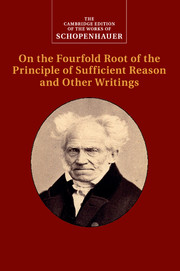Book contents
- Frontmatter
- Contents
- General Editor’s Preface
- Editorial Notes and References
- Introduction
- Notes on Text and Translation
- Chronology
- Bibliography
- Collation of the Two Editions of On the Fourfold Root
- 1 On the Fourfold Root of the Principle of Sufficient Reason
- 2 On Vision and Colours
- 3 On Will in Nature
- Glossary of Names
- Index
Comparative Anatomy
Published online by Cambridge University Press: 30 June 2022
- Frontmatter
- Contents
- General Editor’s Preface
- Editorial Notes and References
- Introduction
- Notes on Text and Translation
- Chronology
- Bibliography
- Collation of the Two Editions of On the Fourfold Root
- 1 On the Fourfold Root of the Principle of Sufficient Reason
- 2 On Vision and Colours
- 3 On Will in Nature
- Glossary of Names
- Index
Summary
From my proposition that Kant's ‘thing in itself ‘, or the ultimate substrate of every appearance, is will, I have not only deduced that will is the agent even in all unconscious functions of the organism, but likewise that this organic body itself is nothing other than will appearing in representation, will itself intuited in the form of cognition of space. Consequently I have said that just as each individual momentary act of will presents itself at once, immediately, and inevitably in the external intuition of the body as an action of it, so every animal's collective willing, the totality of all its strivings, must have its true imaged in the entire body itself, in the nature of its organism, and there must be the most precise agreement between the ends of its will in general and the means that its organization provides for achieving these ends. Or put briefly: the collective character of its willing must stand in exactly the same relation to the form and nature of its body as the relation between the individual act of will and the individual bodily action that carries it out. – In recent times thoughtful zootomists and physiologists have, for their own part and independent of my theory, recognized this as a fact and accordingly corroborated it a posteriori: their statements on this lay out nature's evidence for the truth of my theory.
In the fine copper plate work On the Skeletons of Predatorse by Pander and d’Alton, 1822, p. 2, we find ‘Just as what is characteristic of the bone structure arises from the character of animals, so this develops in turn from their inclinations and desires … These inclinations and desires of animals, which are expressed so vividly in their whole organization and of which the organization appears only as a mediating expression, cannot be explained from particular fundamental forces since the inner ground can only be derived from the general life of nature.’ – By this last turn of phrase the author actually affirms that he, like any natural scientist, has here reached the point where he must stop because he bumps up against the metaphysical, and that at this point, however, what is ultimately recognizable, beyond which nature evades his research, is inclinations and desires, i.e., will.
- Type
- Chapter
- Information
- Schopenhauer: On the Fourfold Root of the Principle of Sufficient Reason and Other Writings , pp. 351 - 370Publisher: Cambridge University PressPrint publication year: 2012



